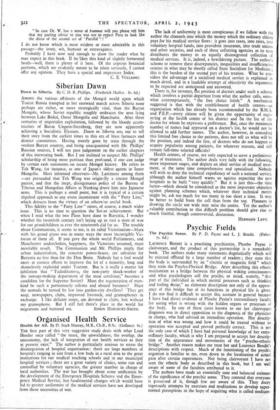Siberian Dawn
Dawn in Siberia. By C. D. R. Phillips. (Frederick Muller. 8s. 6d.) AMONG the various offshoots of the Mongol world upon which Tsarist Russia trampled in her eastward march across Siberia none perhaps are richer, or more strategically vital, than the Buryat Mongols, whose Soviet republic roughly embraces the area lying between Lake Baikal, Outer Mongolia and Manchuria. After three centuries of imperialist exploitation, followed by the bloody eccen- tricities of Baron Ungern-Sternberg, they are now apparently achieving a Socialistic Elysium. Dawn in Siberia sets out to tell their story from the earliest times to this era of blast furnaces and district committees. Having merely gone by train through the verdant Buryat country, and being unacquainted with Mr. Phillips' Russian sources, I will not pass judgement on the earlier chapters of this interesting book. But I am inclined to suspect Mr. Phillips' scholarship of being more partisan than profound, if one can judge by certain rash statements on recent Mongol history. He refers to Teh Wang, for instance, as one of Japan's oldest agents. in Inner Mongolia. Most informed observers—Mr. Lattimore among them —are persuaded that Teh Wang was originally a sincere Mongol patriot, and that the inept, disingenuous policy of the Bureau of Tibetan and Mongolian Affairs at Nanking drove him into Japanese arms. This is perhaps a small point, but it is typical of a certain slipshod approach to any event inconsistent with the " Party Line," which detracts from the virtues of an otherwise useful book.
This fidelity to the " Party Line " raises, of course, a much wider issue. This is no time to question the Soviet achievement.- But when I read what the two Plans have done to Buryatia, I wonder whether the twentieth century isn't laying up as vast a store of woe for our grandchildren as ever the nineteenth did for us. The trouble about Communism, it seems to me, is its rabid Victorianism—Marx with his grand piano was in many ways the most incorrigible Vic- torian of them all. If you gave the whole world Parliaments, and Manchester underclothes, happiness, the Victorians assumed, must inevitably result. The Lommunists and Mr. Phillips imply that urban industrialism, the concrete power-house, are salvation for Buryatia no less than for the Don Basin. Nobody but a fool would sneer at earnest efforts to improve the lot of a minority, long and shamelessly exploited under Tsarism. But is it really a matter for jubilation that " Tudatkhanova, the non-party shock-worker of the sausage-making department of the meat combinat," becomes a candidate for the Supreme Soviet? Must the regeneration of man- kind be such a portentously solemn and absurd business? Must the nomads be turned by law into garden-city dwellers? • They get soap, newspapers, clubs, improved livestock, and gramophones in exchange. I like delicate soaps, ant devoted to clubs, lost without my gramophone. But I still feel there's place ill the world for


























 Previous page
Previous page